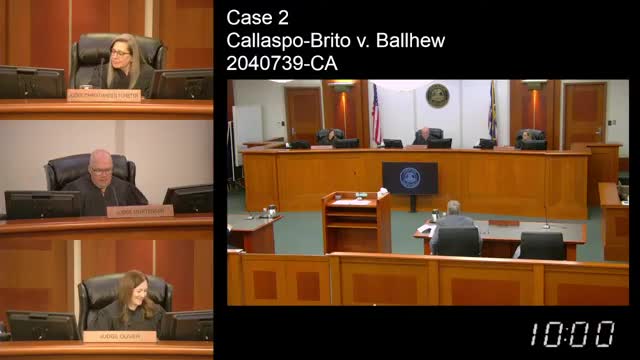Appeals court hears challenge over jurisdiction and a defective verdict after trial de novo in arbitration case
Get AI-powered insights, summaries, and transcripts
Subscribe
Summary
The Utah Court of Appeals heard competing arguments about (1) whether a party may appeal a district-court judgment after invoking a statutory 3-21 arbitration and trial de novo and (2) whether a trial judge abused discretion when reinstructing the jury after a verdict form returned with damages left blank.
At oral argument, counsel debated whether the Court of Appeals has jurisdiction to hear an appeal after a party proceeded from a statutory 3-21 arbitration to a trial de novo in district court, and whether the trial judge abused his discretion in addressing a jury verdict that omitted a damages number.
Daniel Birchford, identified at the hearing as representing the appellant, told the court, “The right to appeal is strictly statutory. And the legislature has granted a plenary right of appeal from the district court in all civil cases.” Birchford argued that the statutory arbitration scheme at issue (referred to throughout argument as a “3-21 arbitration”) contains language that must be read alongside the broader statutory appeal right and that the court should be cautious before reading away appellate review.
Opposing counsel defended the district court’s conduct after a defective jury form. Counsel described the trial’s central dispute as whether a driver entered the intersection on a green or red light and said jurors had substantial evidence to support the verdict. The appellee’s lawyer summarized trial evidence and urged the Court of Appeals to uphold the trial judge’s decision to call the jury back after it returned a signed verdict form that left damages blank, to poll jurors, and to offer a neutral reinstruction.
A focal procedural dispute in the argument was how the trial court should respond when a jury returns a verdict form the judge believes is defective. Counsel and the panel discussed options the trial court may have — sending the jury back for further deliberation, reinstructing on liability or damages, polling jurors, or instructing the jury to finish answering outstanding questions. Appellant counsel argued the judge’s improvised explanation (including a remark that he was “guessing” the jurors had transposed a 70/30 allocation of fault) was nonneutral and therefore an abuse of discretion under Utah precedent requiring neutrality when reinstructing a jury.
The appellee emphasized the trial court has discretion to remedy defective or informal verdicts (Rule 47), that the trial judge did consult counsel in a sidebar and invited further deliberation, and that the transcript shows the jury was polled and reaffirmed the verdict. Appellee counsel argued there was no record evidence that the judge biased jurors or impermissibly influenced the outcome.
The Court questioned where the line should be drawn between reasonable judicial management of a defective verdict form and statements that could be perceived as guiding the jury toward a particular result. Judges also explored the broader statutory question raised by appellant counsel about whether an arbitration designated under the statutory 3-21 framework (a unilateral statutory arbitration elected by one party) meaningfully limits appeal rights when followed by a district-court trial de novo.
The Court took the matter under advisement and said it would issue an opinion in due course.
